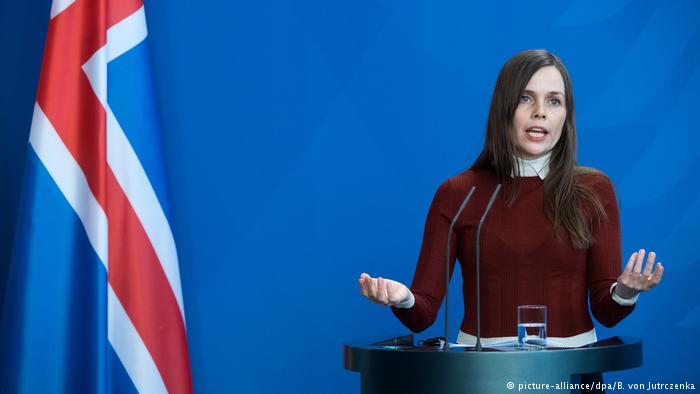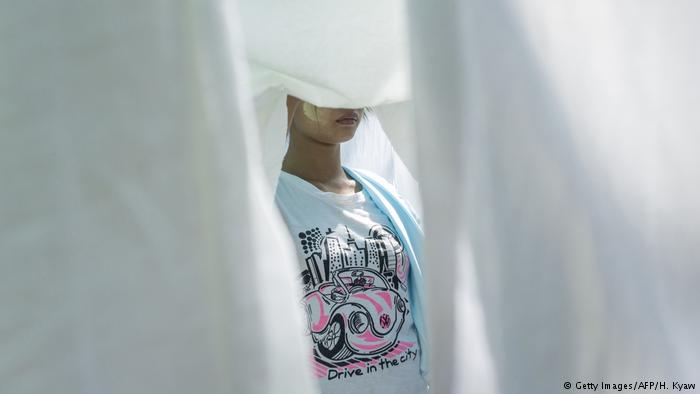From blogger to entrepreneur – an interview with Sabrina Spielberger
The founder of digidip is one of Germany’s most successful female digital entrepreneurs. She spoke to DW’s Manuela Kasper-Claridge about her company and how she got to where she is today.
Sabrina Spielberger started out as a successful blogger. Then in 2013 when she was 28, she founded the company digidip. Today she does business in more than 40 countries. Manuela Kasper-Claridge spoke to her about the obstacles she has faced when it comes to expanding abroad, the shortage of skilled labor in Germany and the importance of networking for women.
DW: How would you describe your product?
Spielberger: Essentially we serve two sides. On the one hand, there are those people running websites like bloggers, magazines and influencers; and on the other hand there are online shops. It’s like a market place. Online shops want to draw more attention to themselves so they work with us and we suggest websites and bloggers that could talk or write about these online shops. Additionally, we also give bloggers the opportunity to earn money. With the help of about 100 affiliated networks, we connect tens of thousands of online shops through an interface that we have created.
And now you want to take your business international?
We’re already international. In fact, I started to expand our business into France during our second year. I started by going into countries where our biggest competitors weren’t yet active. Then in 2016, I mustered the courage to attack the big players as well. That was in the UK and that worked out pretty well and now the US is our big goal. Actually, we already operate in more than 40 countries.
When you say the US is your goal — can you do all of that online or do you need people on the ground?
I was in New York just recently and one of our potential clients asked me: “Why don’t you have an office here?” I told him: “Well, would you prefer that I pay $200,000 (€172,000) a year for an office in New York or would you rather that I spent that money on you?” He was happy to accept that. It’s just a fact that having an office in London or New York is incredibly expensive. And thankfully, since our business is digital a lot of it can happen via e-mail, on the phone or over Skype.
How do you find good employees? That seems to be quite difficult these days?
It is super difficult. And I have to honestly say that I just trained most of them myself. My director of sales came to us straight from university and didn’t have a clue. I just trained him. Initially it was just him and me and one programmer. He is still with me and now he is the one who trains new sales people, just the way I trained him. So it’s not easy. When I’m looking for good programmers in Berlin, for example, I have no chance of finding any. It’s like the housing market — just no chance.
Then where do you find programmers?
Sometimes through contacts, through other programmers that I know. You just have to be really careful not to drive the good ones away.
And what do you have to offer them?
For programmers it’s very important that their jobs give them space to develop. The programmers in my team really appreciate that they have free reign, that they can contribute their own ideas in the development of our products, that they aren’t just robots that have to program but that they can really add their own input.
Has it ever made a difference that you are a woman? Or was that completely irrelevant for the development of your company?
I’m in an industry that is very male-dominated. I’d hear things like: “It’s really great that you are doing this. And as a woman, too,” and stuff like that. People would stress that as if being a woman was a disability. I would just accept that with an appreciative nod.
On the other hand, I always like it when men — older men too — tell me: “I think this is really great. Let’s work together. Someday, I want my daughter to do something like this too, and I want her to have a role model.” So there was some support — also from other women. I never felt particularly discriminated against. Sure, at first, but I’m not sure if that was because we were still fairly small, that some people didn’t take us so seriously. But I have always been able to compensate for that pretty quickly with my big mouth.
Is it really so important for women who want to start businesses to have role models?
Yes, definitely. I try to go to events for female entrepreneurs as often as possible and to talk to the women there to alleviate their fears, to give them advice about how to stay afloat when you don’t have any money.
So networks are important?
Networks are decisive. Initially, I completely neglected that. I didn’t really think it was important. I always thought they were a complete waste of time, but now I regret that I didn’t work on that sooner.
Interview: Manuela Kasper-Claridge







